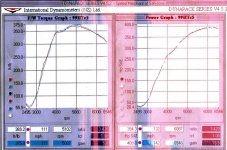Roscobbc
Moderator
So comparing the 'stock' 508 hp / 425 ft/lbs against your custom tune 615 hp / 522 ft/lbs the only differences are in 'the tune'? - no mechanical changes?I agree with you and can prove your viewpoint
Owner of a 2013 C6 Z06 came to me for custom tuning
First I did a testrun and with OBD-II scanner recorded many of the engine PIDs (parameters) and then analyzed that data and
from that custom tuned the stock GM tune into changes I made and flashed into the PCM
On the same day I then did a testrun on the same road and here we see the results and performance gains of the LS7 engine with just the tune
This shows how much GM had detuned what the engine really could do
Stock GM calibration ...................... My Tune
Max timing during PE (Power Enrichment going to WOT)
16 Deg ..................................... 22 Deg
Testrun Distance
37 Miles ............................................ 26 Miles
Fuel Injector Duty cycle (how hard the injectors were working)
91% ...................................................... 74%
Reported Engine Knock
524 Times ........................................... 9 Times
Maximum Speed I drove in MPH
128 MPH ............................................... 136 MPH
Reported flywheel Torque generated
425 ft/lbs .............................................. 522 ft/lbs
Reported flywheel HP generated
508 HP ................................................. 615 HP
All my manual shifts were done at 6,900 RPMs (Redline is 7,200 RPMs)
So this shows that the GM design of the 427 CI LS7 could handle a lot more than they allowed in the tuning
which is to reduce changes of engine failures to limit warranty claims and better gas mileage
I did this tuning back in 2015 and the owner to this day has raced the C6 Z06 many times and has had no engine problems
He sends me a OBD-II scanner recording about once a year to see if all is well or if tune needs to be tweaked as
parts age.
So before throwing on expensive mods, have a good custom tune done and then decide if more is needed
What is the downside of your custom tune - will the engine be more likely to 'grenade' itself? - or higher wear rate - what effect will this have on fuel efficiency when engine use in a normal way? - could one expect the above results from a 'good' stock C6Z06 engine?

